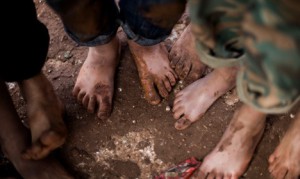“That is a low estimate. I could imagine that there are many, many more,” Yassin Ekdahl, committee secretary at the office of the national coordinator, told Swedish radio on Tuesday.
Many more are believed to have been born in Isis-controlled areas of the Middle East, where their mothers have married militants and then given birth in the region. If a mother (or father) is a Swedish national, her child automatically becomes a Swedish citizen, which makes estimating exact numbers difficult.
Some of these children eventually return to Sweden, after having spent months or years being raised in the midst of an armed conflict, according to Ekdahl. But unlike refugee children, who often receive psychological assistance for post-traumatic stress, many of these parents never seek help.
“[The children] look at killing as a part of daily life, they experience bombs and learn the justification of killing people of a different faith. There are also cases where mothers have been the victims of rape where the child has been there to see and hear everything,” he said.
Ekdahl added that many children show signs similar to post-traumatic stress disorder.
“It is shown in the way they play, which is often morbid and about death and beheadings. There are a lot of nightmares, anxiety, fear and above all a lot of aggression,” he said.
Swedish security service Säpo said last year that more than 125 Swedes were believed to be fighting in Syria and Iraq, of whom 35 are women.
Back in May, Magnus Ranstorp from the Swedish Defence University told The Local that while some women and teenagers were persuaded or forced to travel to the Middle East by friends and family members, others “look up to the fighters like pop stars” and leave home of their own accord.
“For a lot of the girls this is a form of emancipation in a perverse way. They think they are getting away from the leash of patriarchal structures in their families or the areas where they live,” he said.
thelocal.se



